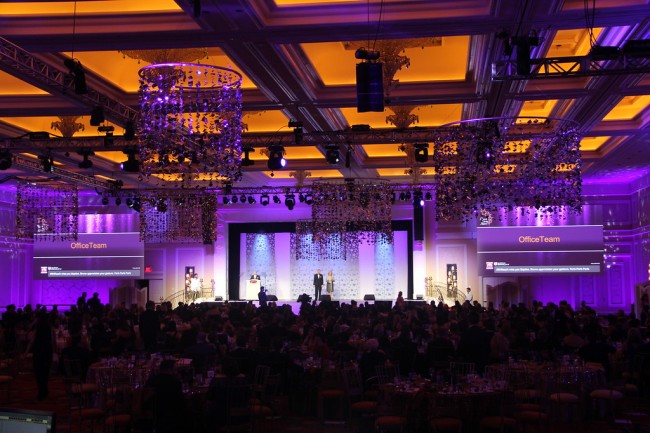
Often, event planning starts with imagination and vision. However, imaginations can run wild, and visions can be over the top. When beginning event planning, your mind may wander to extravagant venues, indulgent foods, world-renowned keynote speakers, Grammy-winning performers, doves or fireworks (hopefully not both), or high-tech features, such as light shows, virtual reality, and holograms. Then, in your first event planning meeting, reality sets in when someone on your team mentions your event budget.
But just because you have an event budget to follow doesn’t mean you have to miss out on elements that can make your next corporate event unforgettable. One of the most important aspects of planning is understanding your budget and finding ways to maximize your spend in order to deliver an event that excites your guests without breaking the bank.
Quick Links
- Why an Event Budget Is Important
- Top Three Benefits of Event Budgets
- How to Determine Your Budget
- Event Planning Costs to Consider
- Seven Tips to Building Your Event Budget
Why an Event Budget Is Important
As anyone managing a business or household can tell you, budgeting is crucial. Not only may money be limited (especially in a business where allocation of funds for events may be low priority), but you also want to ensure there’s a decent return on the investment. Sticking to an event budget is more than keeping the C-suite happy; it’s about being able to determine the overall impact of your event and whether it met your goals.
The event budget will also enable you to make vital decisions for your event - from the venue to entertainment and activities. This is why so many of our event planning blogs mention goals and budget early. They’re both key pieces to starting the planning process, as they inform so many other choices.
Top Three Benefits of Event Budgets
Obviously, the first and most obvious benefit is avoiding overspend. However, there are other significant benefits of establishing and adhering to an event budget.
1. Event alignment - Once your team has determined the goal of your event, the budget can ensure you achieve it. The goal should help determine how and where you spend your money. For example, if your event goal is to build awareness, branded swag and other takeaways may be a better investment than planning a destination event.
2. ROI - The overall cost of the event will help you measure and track the event’s success in terms of revenue. You’ll want to consider how your spending on the event increased revenue, productivity, customer loyalty, or whatever measure your organization decides is your goal. For example, if you can track the cost of customer acquisition, you can track the cost of building customer loyalty. If you can track the cost of employee retention, you can measure employee events against that as well.
3. Solidifying and supporting organizational goals - Your business likely has an overall event budget with individual events falling under that umbrella. Budgeting for individual events can help firm up your organizational goals and objectives for the year. If team building, morale, and employee retention are big organizational goals, then budgets for those events should represent those goals within the larger event budget.

How to Determine Your Budget
As noted above, not every event has the same goals or needs. Therefore, determining your budget should factor into the following elements:
Event scope - This provides a general overview of the who, what, where, and why of your event. Alignment here is essential. For example, an extravagant event marking a small milestone may not be appropriate, meaning it shouldn’t require the budget of a more important event.
Size of your company - When spending here isn’t commensurate, it may signal trouble to investors or other stakeholders.
Size of your audience - You don’t want to purchase more space, more food/beverage, or more swag than the amount of people attending.
Location of the event - An on-site event will likely have a smaller budget than an off-site program. Event scope and purpose will help determine your location needs.
Event Planning Costs to Consider
When considering event planning costs and your event budget, it’s easy to remember the central elements of event planning, such as food and beverage, venue rental, entertainment, and speakers. Additionally, some of these costs can be covered if there are event sponsors. However, where things tend to add up are the elements that are often overlooked.
Event tech - When it comes to providing and ensuring tech reliability and high-tech features, you must include these in your budget. Further, as hybrid events become more and more popular, it may be worth investing in technology that will support these types of events as renting technology or relying on venues to provide quality tech may be a mistake.
Event labor - While some vendors and venues will provide staff, sometimes you will need to hire or pay for additional support, such as valet parking, coat check, additional servers, registration support, etc.
Transportation and accommodations - Airfare can add logistical questions to your list of budget items. Travel to and from airports, travel between venues, travel to activities, accommodations for VIPs -- any number of these can add up if not accounted for, and there are ways to save when you plan! Make sure to take the time to plan for these situations early in your budgeting process.
Swag - Though it is often thought of last minute, event gifting is an important aspect of your program. Swag is the event takeaway; it’s what reminds your attendees of the event itself, so it should be considered when planning.
Decor - When providing the kind of event experience your guests will keep talking about well after it’s over, one of the most important elements is the decor and ambiance. That said, it’s not an area you want to skimp on.
Event planners - Once you’re in the planning process, you may realize there are numerous moving parts and logistical issues to take on, which may be too much for your team. Not only that, but an event planner (while a budget line itself) can save money in various areas. Through partnerships and established relationships with vendors, an event planner can get you deals, save you money, and stretch your budget.

Seven Tips to Building Your Event Budget
Now that we’ve considered some of the important aspects and associated costs, let’s look at the concrete ways to build your budget.
1. Establish the event goal
We cannot stress enough how important setting an objective for an event is when it comes to planning all facets of your event, including the budget. Smaller goals may require smaller spending.
2. Determine the type of event
Whether it’s a live, virtual, or hybrid event, understanding how you’ll deliver event content and presentations will inform several of your budget lines. You may want to consider two different budgets for the in-person and virtual aspects of the event.
The needs of a virtual audience are quite different than the needs of an in-person audience, so lumping their budgets together may result in oversight or under-delivering event content to one of those audiences.
3. Seek out sponsors early
When sponsorship is an option, you don’t want to seek them out when you’re already cash-strapped. Instead, identify good opportunities and beneficial partnerships early, and approach them with sponsorship packages that reflect the value of both your audience and the event. Being prepared to leverage what you offer to help fund your event and knowing early on what outside funds you can count on can help you spend elsewhere.
4. Think green (and long-term reinvestment)
If you’re the kind of company that frequently hosts events, consider what types of tech, decor, or other materials are reusable and may be worth investing in. Further, if you have a great speaker or valuable presentations, what other ways can you offer (and perhaps monetize) that content? Reuse isn’t just for objects!
5. Stay flexible
As you firm up certain costs, you may realize other aspects are less important or even less expensive than originally planned. Keeping the budget fluid (and on file for your next event) can improve your planning process and enable you to do more than you originally thought.
6. Budget for backups
Outdoor event? Budget for tents. Destination event? Budget for travel insurance. The last thing you’ll want to do is have to change plans and find that you’re fiscally unprepared. Having either a flexible budget line to handle backups or incorporating the costs of contingency plans in your original budget is a smart move.
7. Create an internal event team
Even if you hire an event planner, having an internal event planning team or committee is essential. Throughout the planning and preparing process, this team should be reviewing the budget and ensuring that no line is over budget. If it is, this team should be prepared to institute our fifth tip: keep it flexible. Having a team that can analyze costs and adjust where needed is essential. One of the most overlooked aspects of event planning is flexibility and agility.
While building your budget is an internal matter, maximizing it doesn’t have to be. The Bishop-McCann team has years of experience in building memorable events that stay in budget. Our experience and expertise mean you deliver the experience you envisioned, the program your attendees rave about, and the event that doesn’t blow your budget.
As you plan your events budget for 2022, now’s the time to reach out to our team to learn how we can help!
